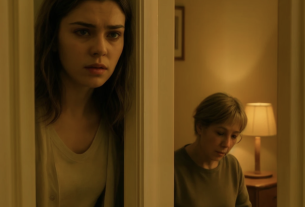Grigory nervously paced around his spacious room, furnished with tasteless, aggressive luxury — the kind he adored and his wife Marina despised. But now the interior was deeply indifferent to him. A scheme kept spinning in his mind — a perfect plan, as he thought, capable of making him the sole and complete owner of everything that belonged to Marina. However, a recent frustrating, almost unbelievable mistake had been discovered in this plan.
He hadn’t married her out of love. That feeling was foreign to him. He was driven by cold, calculating goals — power and money. For him, Marina was a gold mine: a successful, smart woman, but too trusting. She saw Grigory as a reliable support, a protector after difficult years of loneliness when she raised her daughter alone. But he saw her as an object that needed to be controlled.
The only obstacle from the very beginning was Liza — her daughter. A girl with a penetrating gaze, too serious for her age. She seemed to see through the facade of politeness and feigned care, sensing the emptiness inside Grigory. Her silent distrust irritated him more than any open accusations.
His thoughts returned again to the accident. He still tasted the metallic flavor of triumph in his mouth when he received the call that Marina’s car had gone off the road. The brakes — a banal, precise malfunction, arranged for a good reward. Everything was supposed to be quick and clean. But Liza… The damned girl suddenly refused to go with her mother, citing exams. She stayed home. Alive. Well. And most likely, she suspected everything.
What infuriated Grigory even more was that Marina’s business kept running despite her coma. The firm functioned like clockwork thanks to her loyal deputy and other employees who clearly disliked him. He was already imagining walking into Marina’s office, sitting in her chair, and with one stroke of a pen sending all those loyal people packing.
The phone rang. He picked up, already knowing who was calling.
“Well?” he snapped into the receiver.
On the other end came hesitant excuses. His people had failed the task again.
“She’s nowhere to be found, Grigory Igorevich. Neither at stations nor airports. The card hasn’t been used; the phone is off.”
Grigory squeezed the receiver until his knuckles whitened. Fury boiled inside him — at the incompetent mercenaries, the stubborn girl, and his own helplessness. He was so close, yet this small snag could ruin everything. She needed to be found. Urgently. And made so she would never be able to say anything again.
Liza sat on the old, rattling suburban bus, pressing her forehead against the cold window glass. She had been traveling for hours, changing routes like a hare dodging hunting dogs. Every sharp sound made her flinch. The tears shed at night had long dried up. Only fear for her mother and icy determination remained. She had to do this. For her mother’s sake.
A week ago, even before the accident, a strange and important conversation had taken place between her and her mother — unexpectedly started by Marina herself. Over evening tea, she set down her cup and looked at her daughter for a long time with some sadness.
“You know, Liza, I wasn’t always so composed and strong,” she quietly said. “Once, I was just a girl in love.”
She told her about Pavel — Liza’s father. About how deeply they loved each other, about walks until dawn, about fiery arguments and youthful pride that wouldn’t allow forgiveness of mistakes. About how they were separated by the intrigue of her best friend, who was in love with Pavel. Marina believed her eyes without hearing any explanations. And he, no less proud, simply left.
When the conversation was ending, her mother handed her a folded sheet of paper.
“Here’s his address. I recently found out where he lives. A village, far from here. Take it. It might come in handy.”
At that time, Liza hadn’t given much weight to the words. “What could happen?” she thought. But now, recalling Grigory’s triumphant smirk after hearing the news of the accident, she understood everything. This was the “case.” And now this scrap with the address had become her last hope. The only chance to save her mother from the man she had let into their lives.
The journey had exhausted Liza to the limit. The village greeted her with silence, the smell of damp foliage, and crooked fences. Twilight floated silently through the streets; somewhere in the distance, a dog barked. Liza stood in the middle of this lost corner, feeling lonely and lost. Fatigue pressed on her legs; her stomach twisted from hunger, but she did not allow herself to give up. She had to cope.
Looking around, she noticed an old man in a worn ushanka hat carefully drawing water at a well. He seemed kind and safe. Gathering her last strength, Liza approached him.
“Hello, excuse me, please…” her voice trembled betrayingly, and she straightened with effort. “Could you tell me how to find Pavel Savelyev?”
The old man slowly set down the bucket, straightened with a groan, and carefully looked her over from head to toe.
“Savelyev? Pavel?” The man scratched the stubble on his chin. “No, daughter, we don’t have anyone by that name. We do have Savelyevs here, of course, but they’re usually called Ivan or Stepan. But Pavel, I don’t recall.”
Liza’s heart froze. A sharp coldness pulled at her chest; a lump of despair stuck in her throat. Could she be wrong? Had she come to the wrong place? Maybe her mother had mixed up the address? What now?
“But… he must be here,” she forced out, feeling tears begin to fill her eyes. “Pavel Andreyevich Savelyev.”
Suddenly the old man slapped his forehead so that his hat slid sideways.
“Oh, my head! Andreyevich! You should’ve said so right away! Of course, we know him! He’s our doctor, a real treasure trove of knowledge and golden hands. He treats the whole district.”
Relief washed over Liza like a wave. Her legs nearly gave way. She barely held on, clutching the edge of the well.
“A doctor?” she repeated, still not believing.
“Indeed! See that stone building around the corner? That’s our clinic. He’s probably there now. Just walk straight down the path — you won’t get lost.”
Thanking the old man hurriedly but sincerely, Liza ran in the indicated direction. She no longer felt fatigue or hunger. Only a burning urgency to speed up time — every minute could be crucial.
She saw him at the entrance of a one-story hospital building. He was talking to a woman, and Liza stopped a little away to catch her breath and just watch. Tall, broad-shouldered, with a short haircut already touched with gray. There was something calm and reliable about him. He was nothing like the photo in her mother’s album, but Liza immediately knew: this was him. Her father. No doubt.
She stepped forward decisively and interrupted their conversation. The woman gave Liza a surprised look and left. Pavel turned to the girl, confusion flashing in his gray eyes — the same as hers.
“How can I help you?”
Liza took a deep breath, pushing aside her anxiety and rehearsed words.
“My name is Liza. I am your daughter. And my mother needs help. Marina. Her life is in danger, and I have nowhere else to turn.”
Pavel froze. His face became a mask of amazement, disbelief, and some painful confusion. He examined the girl’s features — the familiar eye shape, lip form, even the expression. A flash of the past, a reflection of the woman he once loved to the point of pain. The longer he looked, the clearer it became: it was true.
The shock passed. In its place came the doctor — a man capable of making decisions in critical situations. He took Liza by the elbow; his touch was confident and soothing.
“All right,” he said firmly, heading toward his office. “Tell me everything in order.”
Meanwhile, hundreds of kilometers from the village, Grigory sat in the office of a city clinic doctor. He leaned back in his chair, one leg crossed over the other, and watched the doctor with a smug smile.
“Let’s skip the formalities,” he said, placing a thick envelope on the table. “Marina is already unresponsive. Brain dead, reflexes alive. We both know it. Why drag out the farce? It’ll be a relief for both of us.”
The doctor, a middle-aged man with tired eyes, flinched. He glanced from the envelope to the window, where distant city lights twinkled in the dark.
“I can’t… It goes against all my principles…”
“You can’t eat principles,” Grigory smirked. “And this is enough not only to feed the family but also to buy a house by the sea. One move. Equipment failure. Everyone will confirm it. Think about it.”
The doctor hesitated. His eyes flicked over the stack of money. Grigory saw the internal struggle within the man and was confident of victory. He stood up.
“I’m waiting for your call,” he said and left, already anticipating freedom and wealth.
But around three in the morning, a phone call woke him. Lazily stretching, he picked up the receiver, smiling into the dark. Now he would hear the long-awaited news.
“Yes, I’m listening,” he drawled sleepily.
But instead of condolences, there was a frightened, almost hysterical scream:
“Grigory Igorevich! She’s gone! She disappeared!”
“What?!” he sharply sat up in bed. “How did she disappear?!”
“Just vanished! The bed’s empty! We searched everywhere!”
Half an hour later, he was at the hospital, where chaos reigned. Police, worried doctors, disorder. Cameras were turned off “for maintenance.” The only witness — a guard reeking of alcohol — muttered incoherently about a man in a black jeep who gave him mead. After which the guard “dozed off a bit.”
Grigory listened, and with every word, the ground slipped from under him. He had been played for a fool. He lost.
Marina slowly awoke from the deep, viscous darkness. The first to come was memory — a flash of light, a blow, pain, and Grigory’s face, distorted not by grief but by triumph. Betrayal. She realized everything at the last moment before consciousness left her. Now fear gripped her again — cold and burning. She tried to move, but her body wouldn’t obey. Only a hoarse whisper escaped her lips:
“Liza…”
“Shh, shh. She’s safe.”
A familiar, calm male voice pierced through the veil of fear. Marina struggled to open her eyes. At first, the world was blurry, then the outlines became clearer. Pavel stood before her. Older, with gray hair, but the same — with kind and attentive eyes. She couldn’t believe her eyes. It seemed like a dream or hallucination.
“Pavel?” she whispered.
He smiled, and familiar wrinkles appeared at the corners of his eyes.
“I’m here. You’re safe. We saved you. You’re in the village of Saloniki, in my hospital.”
His voice was like a warm blanket on an icy wind. Marina understood nothing but felt the main thing — she was out of danger. She looked at him one last time, and her eyes closed on their own. She fell asleep again, this time with a slight, barely noticeable smile on her lips. Because if Pavel was near — everything would be fine.
—
Grigory decided that Marina’s disappearance was even for the better. Now there was no need to wait and make plans — he could immediately start the procedure to declare her missing. And that was almost a direct path to inheritance. To celebrate the imminent wealth, he threw a loud party at home: music thundered throughout the house, champagne flowed like a river.
But in the middle of the celebration, the door flew open, and people in uniform appeared on the threshold.
“Grigory Igorevich? You are under arrest on suspicion of attempted murder.”
The music abruptly stopped. All eyes turned to the host. And then, from behind the police, Liza appeared. She stood with arms crossed, cold contempt in her eyes, looking at the one she no longer feared.
As the handcuffs clicked on his wrists, Grigory muttered through clenched teeth as he passed by:
“You’re celebrating for nothing, brat. Your mother won’t last long anyway. Hope she dies somewhere in a ditch.”
Liza did not flinch. Calmly meeting his gaze, she smiled slightly and quietly replied:
“You won’t wait. Mom is alive, healthy… And soon getting married again. To my father.”
Six months later. A sunny day in the village wrapped everything in warm light. Marina, fully recovered, sat on Pavel’s veranda and argued with him — lightly, almost playfully. Happiness sparkled in her eyes; her face bloomed with health.
“Pasha, I can’t stay here forever. I have business, friends in the city…”
“And I can’t just leave my patients,” Pavel stubbornly shook his head. “Besides, the air here is different.”
Their conversation was interrupted by Liza, who came out on the veranda with a tray holding a steaming kettle and cups.
“You two really are like children,” she shook her head, looking at them with a kind reproach.
Pavel and Marina exchanged looks and laughed simultaneously. Both understood that Liza was right — they behaved like schoolchildren. But it was wonderful.
“All right,” said Pavel, hugging Marina by the shoulders. “Let’s agree: a week in the city, a week here.”
“Agreed,” she smiled and kissed him.
Liza watched her parents, feeling warmth spread inside her. Everything had fallen into place. She had a family again — real, loving, and whole. The very one she once didn’t even dare to dream of.



